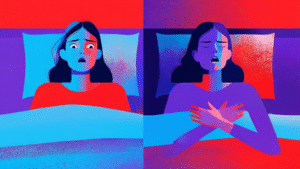Methods for Higher Relaxation and Therapeutic

Trauma can severely disrupt your sleep. For those who’re fighting sleep points after a traumatic expertise, you’re not alone. This text will clarify how trauma and sleep are interconnected and provide sensible options to enhance your sleep well being.
Introduction to Trauma and Sleep
Trauma and sleep are intricately linked, with traumatic experiences usually resulting in vital sleep disturbances and issues. One such situation is Trauma Related Sleep Dysfunction (TSD), a newly recognized dysfunction that impacts trauma survivors, together with those that have skilled fight. Submit-Traumatic Stress Dysfunction (PTSD) is one other well-known situation that may severely disrupt sleep high quality, resulting in persistent sleep disturbances.
Analysis means that trauma can profoundly have an effect on sleep structure, altering how the physique progresses by sleep cycles and phases, notably the fast eye motion (REM) sleep. REM sleep is essential for emotional and psychological restoration, and disruptions on this stage can exacerbate the consequences of traumatic stress. Understanding the connection between trauma and sleep is important for growing efficient therapies and bettering general sleep well being for trauma survivors.
Key Takeaways
- Trauma considerably impacts sleep high quality and structure, usually resulting in power sleep points like insomnia and nightmare dysfunction, which additional exacerbate psychological well being issues.
- Childhood trauma has lasting results on sleep well being, with adversarial childhood experiences (ACEs) linked to persistent sleep disturbances that may persist into maturity.
- A complete strategy combining medical, psychological, and life-style interventions is important for addressing trauma-related sleep issues, with therapies like Cognitive Behavioral Remedy for Insomnia (CBT-I) exhibiting promise.
The Influence of Trauma on Sleep Well being


The impression of trauma on sleep well being is profound and multifaceted. Traumatic experiences can considerably have an effect on the amount and high quality of sleep, leaving people grappling with persistent sleep issues. Trauma survivors usually discover their sleep structure altered, disrupting regular sleep cycles and phases, notably the fast eye motion (REM) sleep that’s essential for psychological and emotional restoration.
For a lot of, the evening turns into a replay of distressing goals and nightmares, additional compounding the trauma’s results. These sleep disturbances aren’t simply restricted to the evening; they spill over into every day life, contributing to signs like melancholy and power fatigue. Every morning can really feel like waking as much as the aftermath of the traumatic occasion publicity and the traumatic expertise, making it troublesome to face the day with power and focus.
The continual misery attributable to trauma-related sleep disturbances can result in a vicious cycle the place poor sleep well being exacerbates psychological well being points and psychological issues, which in flip, additional disrupt sleep. This cycle can even enhance the danger of bodily well being points, akin to coronary heart illness, highlighting the necessity for complete remedy approaches. Scientific sleep drugs acknowledges the numerous position that sleep performs in restoration and psychological well being, making it a vital space of focus for trauma survivors.
In understanding the connection between trauma and sleep, it turns into clear that ordinary sleep is usually a distant reminiscence for these affected. The disturbances in sleep structure not solely disrupt sleep but additionally impression the restorative features of sleep, resulting in a state of power sleep deprivation. This state can have far-reaching penalties on bodily well being, growing the danger of situations like sleep apnea and different sleep issues.
Addressing these points requires a complete strategy that features each medical and psychological interventions. Bettering sleep high quality and addressing underlying trauma can break the cycle of disturbed sleep and promote higher general well being. This understanding units the stage for exploring the precise sleep issues linked to trauma and the long-term results of childhood trauma on sleep. Disruptions in REM sleep will also be linked to neurodegenerative issues, akin to Parkinson’s illness, the place the brainstem’s degeneration impacts muscle paralysis throughout sleep.
Widespread Sleep Issues Linked to Trauma


Trauma survivors usually face a variety of sleep issues that may severely impression their high quality of life. Insomnia is without doubt one of the most prevalent trauma related sleep problem, characterised by issue falling asleep, waking up continuously in the course of the evening, and hassle falling again asleep. This persistent lack of high quality sleep can result in vital daytime impairment, affecting temper, cognitive operate, and general well being.
One other frequent challenge is nightmare dysfunction, which entails frequent, distressing goals that may trigger vital misery upon waking. These nightmares are sometimes vivid and associated to the traumatic occasions, making hassle sleeping a supply of concern and anxiousness issues for a lot of trauma survivors. The repeated disruption of sleep resulting from nightmares can additional exacerbate emotions of fatigue and emotional misery, contributing to a sleep problem.
Obstructive sleep apnea is one other situation that may be linked to traumatic experiences. This dysfunction is characterised by interruptions in respiration throughout sleep, resulting in extreme daytime fatigue and sleep disturbances. The stress and anxiousness stemming from trauma can contribute to the event or worsening of sleep apnea, creating a posh interaction between bodily and psychological components.
Hypersomnolence dysfunction, marked by extreme daytime sleepiness regardless of ample nocturnal sleep, is one other situation that may be exacerbated by trauma. This dysfunction can considerably impression every day functioning and high quality of life, making it troublesome for people to have interaction in common actions or keep employment.
Lastly, REM sleep conduct dysfunction is characterised by irregular actions throughout REM sleep, usually ensuing from elevated stress and anxiousness associated to trauma. These actions can disrupt sleep and result in accidents, additional complicating the sleep well being of trauma survivors. Understanding these frequent sleep issues linked to trauma highlights the necessity for focused interventions and remedy choices to assist people regain management over their sleep and general well-being.
Causes and Threat Elements
Childhood trauma, adversarial childhood experiences (ACEs), and family dysfunction are vital threat components for growing sleep issues and experiencing poor sleep well being. Traumatic occasions akin to bodily abuse, sexual abuse, and witnessing violence can result in power sleep issues, together with issue falling asleep and staying asleep. These early adversarial experiences can set the stage for long-term sleep disturbances that persist into maturity.
Anxiousness issues, temper issues, and different psychiatric diseases can additional disrupt sleep patterns, compounding the consequences of trauma. Traumatic occasion publicity, akin to fight or pure disasters, can enhance the danger of growing PTSD and related sleep issues. Analysis means that the connection between trauma and sleep is complicated, with a number of components contributing to sleep disturbances. Understanding these causes and threat components is essential for growing focused interventions to enhance sleep well being.
Childhood Trauma’s Lengthy-Time period Results on Sleep
Childhood trauma can forged a protracted shadow over a person’s life, leaving lasting results on sleep well being properly into maturity. Those that skilled childhood trauma and childhood abuse are at an elevated threat for persistent sleep disturbances, together with insufficient sleep length and poor sleep high quality. Research have proven that older adults who skilled childhood trauma usually face vital sleep disturbances, demonstrating age-specific vulnerabilities in sleep structure. The impression of such trauma is profound, with retrospective cohort research exhibiting vital associations between childhood trauma and poor sleep in later life.
Remedy performs a vital position in addressing and probably assuaging these long-term sleep points. Efficient therapeutic interventions might help people course of their traumatic experiences and develop more healthy sleep patterns. Nevertheless, the scars left by childhood trauma usually end in altered sleep structure, impacting sleep patterns akin to sluggish wave sleep, which is important for restorative sleep. These altered sleep patterns can persist into late life, with vital adjustments in sleep structure, akin to decreased NREM sleep and elevated fragmentation.
The long-term results of childhood trauma on sleep aren’t only a matter of poor sleep well being; they’ll additionally contribute to a variety of bodily and psychological well being points. This part will delve into the main points of how adversarial childhood experiences (ACEs) and the mechanisms of impression form the sleep well being of trauma survivors.
Adversarial Childhood Experiences (ACEs)
Adversarial Childhood Experiences (ACEs) are vital predictors of assorted long-term well being outcomes, together with sleep issues. These experiences, which might embody bodily abuse, sexual abuse, and witnessing violence, have a profound impression on sleep well being. People with a historical past of ACEs usually wrestle with hassle falling asleep and should really feel drained even after a full evening’s sleep. A inhabitants primarily based research has proven that people with a historical past of ACEs usually tend to expertise power sleep issues properly into maturity.
The results of ACEs on sleep can final for many years, with research indicating that the impression will be felt for as much as 50 years. This extended affect underscores the significance of early intervention and help for youngsters who’ve skilled trauma. Nationwide estimates point out that a good portion of the inhabitants has skilled ACEs, underscoring the widespread impression of those early adversarial experiences on sleep well being. Insomnia is the commonest sleep symptom related to psychiatric issues linked to trauma, additional highlighting the numerous results of the necessity for focused remedy approaches.
Trauma survivors usually carry the burden of their childhood experiences into maturity, going through ongoing challenges in reaching restful sleep. These adversarial experiences disrupt the pure processes of sleep, resulting in power points that may have an effect on general well being and well-being. Understanding the long-term impression of ACEs on sleep is essential for growing efficient interventions and help methods for these affected.
Mechanisms of Influence
Childhood trauma disrupts regular sleep patterns and structure, resulting in power sleep disturbances. Trauma publicity may end up in vital adjustments in sleep patterns, usually manifesting as decreased deep sleep and elevated gentle sleep. These adjustments can impair the restorative features of sleep, leaving people feeling perpetually drained and affecting their general well being.
The mechanisms behind these disruptions are complicated and multifaceted, involving each psychological and physiological components. Early traumatic experiences can alter the mind’s stress response methods, resulting in heightened arousal and issue stress-free. This heightened state of alertness could make it difficult to go to sleep and staying asleep, perpetuating a cycle of poor sleep well being that may final a lifetime.
Remedy Choices for Trauma-Associated Sleep Issues


Addressing trauma-related sleep issues requires a complete strategy that encompasses medical, psychological, and life-style interventions. People with post-traumatic stress dysfunction (PTSD) usually proceed to expertise residual sleep points even after present process therapies like cognitive behavioral remedy. Subsequently, searching for skilled help from docs or therapists is significant for successfully managing these sleep disturbances. Addressing trauma-related sleep issues is essential for managing psychiatric sickness, as sleep disturbances can exacerbate situations like melancholy and anxiousness.
Whereas there’s a want for extra research inspecting the impression of behavioral therapies on trauma-related sleep disturbances, a number of remedy choices have proven promise. These embody Cognitive Behavioral Remedy for Insomnia (CBT-I), pharmacological therapies, and life-style and behavioral adjustments. Every of those approaches presents distinctive advantages and will be tailor-made to fulfill the precise wants of trauma survivors. Psychosomatic drugs highlights the intersection between psychological well being and bodily well being, emphasizing the significance of addressing sleep disturbances in trauma survivors.
Cognitive Behavioral Remedy for Insomnia (CBT-I)
Cognitive Behavioral Remedy for Insomnia (CBT-I) is an efficient remedy that may assist trauma survivors enhance their sleep patterns. This therapeutic strategy focuses on figuring out and altering detrimental ideas and behaviors that contribute to sleep issues. People experiencing PTSD signs ought to talk about remedy choices, together with CBT-I, with their physician.
Standardized screening protocols for sleep issues in PTSD are wanted to make sure complete look after these affected. CBT-I has been proven to be notably efficient in treating sleep issues associated to trauma, providing a structured strategy to bettering sleep high quality. Addressing the cognitive and behavioral points of insomnia, CBT-I helps people develop more healthy sleep habits and break the cycle of disturbed sleep.
The advantages of CBT-I lengthen past simply bettering sleep; additionally they improve general psychological well being and well-being. Serving to people obtain higher sleep high quality, CBT-I can cut back signs of melancholy and anxiousness, additional supporting restoration from trauma. This therapeutic strategy is a useful software within the arsenal of therapies for trauma-related sleep issues.
Pharmacological Therapies
Pharmacological therapies play a vital position in managing trauma-related sleep disturbances. Medicines like prazosin have proven promise in assuaging nightmares and sleep points related to PTSD. These therapies can present much-needed aid for people fighting persistent sleep issues which might be immune to different types of remedy.
Varied medicines are used to handle sleep points in trauma survivors, with some exhibiting vital outcomes. Nevertheless, continued analysis is important to optimize remedy sequencing for trauma and sleep issues, guaranteeing that people obtain the simplest care attainable.
Understanding the precise wants and responses of trauma survivors to completely different medicines might help tailor efficient therapies for higher outcomes.
Way of life and Behavioral Adjustments
Way of life and behavioral adjustments can have a big impression on bettering sleep high quality for these experiencing trauma-related sleep points. Establishing a constant sleep schedule might help regulate the physique’s inside clock and improve sleep high quality. Partaking in rest methods, akin to deep respiration or meditation, can even alleviate anxiousness associated to sleep after trauma.
Decreasing caffeine and alcohol consumption, particularly within the night, might improve sleep high quality for people coping with PTSD. Creating a chilled bedtime routine can sign the physique that it’s time to wind down, aiding within the transition to sleep. Bodily exercise in the course of the day can promote higher sleep at evening, notably for these with trauma-related disturbances.
Optimizing the sleep setting by minimizing noise and light-weight can considerably enhance sleep situations for trauma survivors. These life-style and behavioral adjustments, when mixed with different remedy approaches, can present a holistic answer to managing trauma-related sleep issues and bettering general well-being.
The Position of Psychological Well being Professionals
Psychological well being professionals play a pivotal position in addressing trauma-related sleep points. They’re geared up to diagnose and deal with numerous sleep issues, akin to insomnia, sleep apnea, and nightmare dysfunction, which are sometimes linked to traumatic experiences. By means of remedy and counseling, psychological well being professionals assist people course of their trauma and develop coping methods to enhance sleep high quality.
Cognitive Behavioral Remedy (CBT) and different therapeutic approaches have confirmed efficient in addressing trauma-related sleep points. These therapies give attention to altering detrimental thought patterns and behaviors that contribute to sleep disturbances. Psychological well being professionals additionally educate people on wholesome sleep habits and sleep hygiene practices, akin to sustaining a constant sleep schedule and creating a calming bedtime routine. Their help is essential for trauma survivors searching for to reclaim restful sleep and enhance their general well-being.
Coping Methods for Higher Sleep


Implementing good sleep hygiene practices is important for bettering sleep high quality in trauma survivors. Sustaining a constant sleep schedule might help sign the physique to relaxation at acceptable instances, enhancing general sleep well being. Making a protected and restful sleeping setting is essential for serving to trauma survivors really feel safe and calm, which is important for higher sleep.
Even amongst wholesome people, sustaining a constant sleep schedule and making a restful setting can considerably enhance sleep high quality.
Incorporating rest methods, akin to mindfulness or meditation, into every day routines can enhance sleep patterns for people with trauma histories. Partaking in stress-free actions earlier than bedtime can activate the physique’s rest response, aiding in stress discount and selling sleep. If sleep stays elusive, it’s useful to keep away from forcing it and as a substitute have interaction in quiet actions till feeling sleepy once more.
These coping methods can empower trauma survivors to take management of their sleep well being. Making small, constant adjustments to every day routines and sleep environments can enhance sleep high quality and general well-being. The journey to raised sleep shouldn’t be simple, however with perseverance and the best methods, it’s attainable to attain restful, restorative sleep.
Sleep Dysfunction Prognosis
Diagnosing sleep issues in trauma survivors will be difficult, as signs usually overlap with different situations like PTSD or anxiousness issues. A complete sleep research, which can embody a sleep diary and actigraphy, is important for precisely diagnosing sleep issues and figuring out underlying sleep disturbances. Scientific sleep drugs specialists collaborate with psychological well being professionals to develop a holistic remedy plan that addresses each sleep and trauma-related points.
Analysis means that early prognosis and remedy of sleep issues can considerably enhance sleep high quality and cut back the danger of growing psychological well being issues, akin to PTSD and melancholy. Future analysis ought to give attention to refining diagnostic instruments and growing efficient therapies for trauma-related sleep issues. By advancing our understanding of those complicated points, we are able to enhance sleep well being and general high quality of life for trauma survivors.
Future Analysis Instructions
Future analysis within the subject of trauma and sleep well being is important for refining remedy approaches and bettering outcomes for trauma survivors. Understanding the mechanisms that hyperlink sleep disturbances with PTSD remedy efficacy can considerably improve therapeutic methods. By investigating how completely different therapies impression sleep structure, researchers can develop more practical interventions tailor-made to the wants of trauma survivors.
Furthermore, future analysis ought to give attention to the consequences of pharmacological therapies on sleep issues in PTSD prevalence to determine the simplest choices. This consists of exploring new medicines and optimizing current ones to raised handle trauma-related sleep points. Continued analysis on this space can result in extra customized and efficient remedy plans, guaranteeing that people obtain the care they should obtain high quality sleep.
The potential for future analysis to advance our understanding of trauma-related sleep disturbances is huge. By conducting a vital evaluate, systematic evaluate, meta evaluation, and empirical literature research, researchers can present useful insights into the temporal relations between trauma publicity and sleep issues. Analysis suggests this data can inform scientific practices and enhance the lives of these affected by trauma-related sleep issues, together with those that might profit from a sleep research. Moreover, sleep analysis can additional improve our understanding of those points, notably relating to statistical significance.
Abstract
In abstract, trauma has a profound impression on sleep well being, affecting each the amount and high quality of sleep. Traumatic experiences can result in numerous sleep issues, akin to insomnia, nightmare dysfunction, and obstructive sleep apnea, disrupting regular sleep patterns and structure. Childhood trauma, specifically, has long-term results on sleep, with adversarial childhood experiences (ACEs) considerably predicting sleep issues in maturity.
Efficient remedy choices for trauma-related sleep issues embody Cognitive Behavioral Remedy for Insomnia (CBT-I), pharmacological therapies, and life-style and behavioral adjustments. These interventions might help enhance sleep high quality and general well-being for trauma survivors. Moreover, coping methods akin to sustaining a constant sleep schedule, making a protected sleep setting, and incorporating rest methods can additional improve sleep well being.
Addressing trauma-related sleep disturbances is essential for bettering psychological and bodily well being. By understanding the complicated relationship between trauma and sleep, and implementing focused interventions, it’s attainable to reclaim restful nights and improve general high quality of life. Bear in mind, the journey to raised sleep is a gradual course of, however with the best help and techniques, peaceable slumber is inside attain.
Steadily Requested Questions
How does trauma have an effect on sleep high quality?
Trauma considerably disrupts sleep high quality by altering sleep structure, inflicting difficulties in falling asleep, frequent awakenings, and nightmares. Consequently, this could result in power sleep deprivation and detrimental results on general well being.
What are some frequent sleep issues linked to trauma?
Widespread sleep issues linked to trauma embody insomnia, nightmare dysfunction, obstructive sleep apnea, hypersomnolence dysfunction, and REM sleep conduct dysfunction. Posttraumatic stress dysfunction (PTSD) is a big situation linked to trauma that may severely disrupt sleep patterns. Addressing these points is essential for bettering general psychological well being and well-being.
How can childhood trauma impression sleep in maturity?
Childhood trauma considerably impacts sleep in maturity, usually leading to long-term disturbances akin to inadequate sleep length and diminished sleep high quality. These early adversarial experiences usually result in power sleep disturbance, affecting general well being and well-being. Addressing these early adversarial experiences is essential for bettering grownup sleep well being.
What remedy choices can be found for trauma-related sleep issues?
Cognitive Behavioral Remedy for Insomnia (CBT-I), pharmacological therapies, and life-style modifications are efficient choices for addressing trauma-related sleep issues. Younger adults who’ve skilled trauma might profit from these therapies to handle particular sleep disturbances and enhance general sleep well being. Implementing these methods can improve sleep high quality and promote general wellness.
What coping methods might help enhance sleep for trauma survivors?
To reinforce sleep for trauma survivors, it’s important to take care of a constant sleep schedule and create a chilled sleep setting. Moreover, incorporating rest methods and fascinating in soothing actions earlier than bedtime can considerably enhance sleep high quality.







